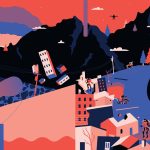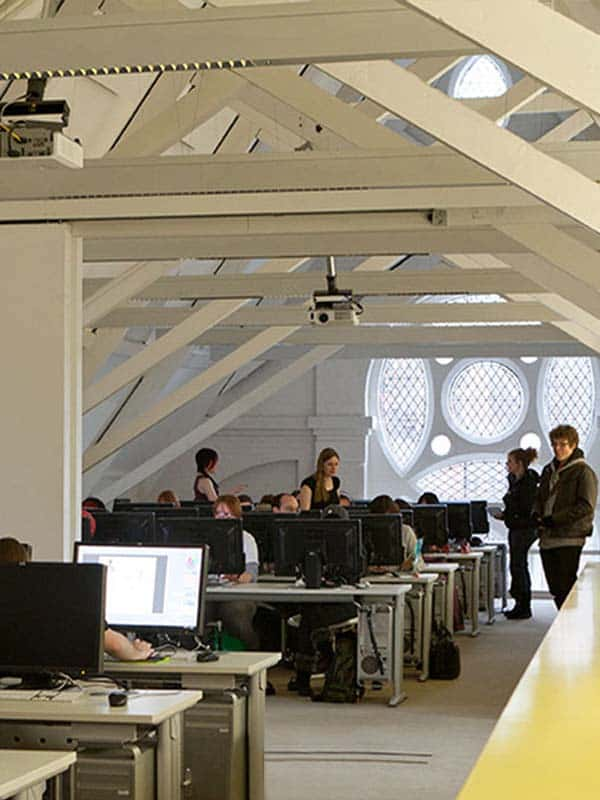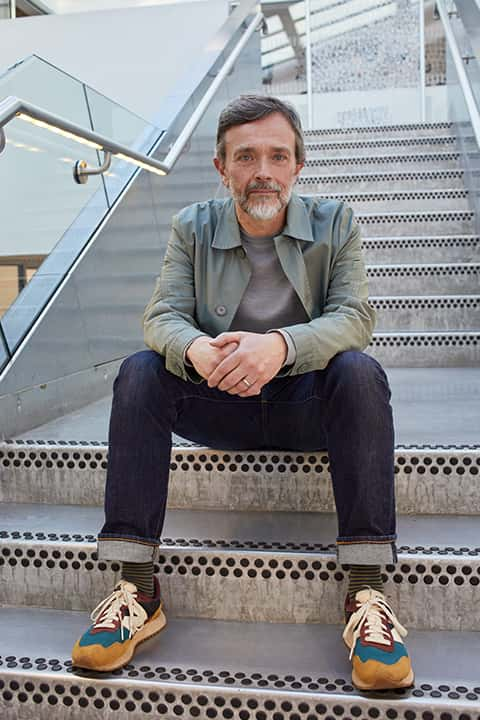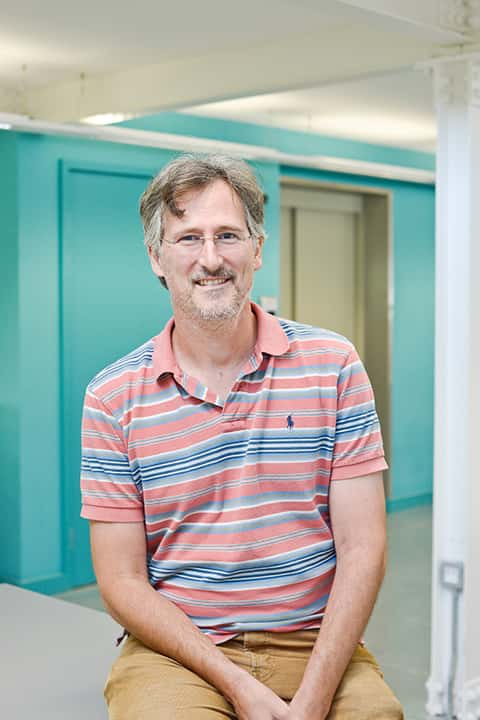


Design for Publishing BA (Hons)
Length:
3 or 4 year options
UCAS Code:
W2AD (3 Year)
W212 (4 Year)
Institution Code:
N39
Sandwich courses:
Creative Professional Development (1 year, Level 5 diploma), or Creative Computing (1 year, Level 5 diploma), available between years 2 & 3
Explore how words and images can come to life on the page and screen to tell stories and deliver information.
This one-of-a-kind course provides students with a specialist education in typography, page design, layout, spatial graphics, image creation and art direction for print and digital applications. BA (Hons) Design for Publishing has a great reputation for producing much sought after graphic designers with a focus on inspiring audiences through story-telling and developing skills to work in the publishing sector and beyond. Idea generation, research methods, content creation, materials and physical making are integral to your projects.
Stefan Sagmeister visits Norwich University of the Arts
Why Study with us
- Develop skills in typography, printing, layout and page design, photography, design research, idea generation, visual narrative and storytelling.
- Learn key technical skills in various design-related software such as InDesign, Photoshop and Illustrator.
- Develop skills in designing solutions to present complex data and information through editorial design and infographics.
- Learn about colour and ink, special print finishes, paper stocks, formats, binding methods, as well as design for screen applications.
- Become adept at understanding and deciphering a brief, research, generating ideas, problem-solving, developing the most successful concept, then executing and presenting the final work.
- Participate in workshops and classes run by external professionals, undertake project briefs initiated and taught by designers from the industry, and enter national and international design competitions judged by the design industry.
- Learn how to prepare a portfolio in both digital, social, and
physical formats, backed-up by exemplars and supported by visiting professionals. - Share your first year with other graphics students, and continue to work alongside each other, allowing for a unique cross fertilisation of knowledge, skills and experience.
Course Content
Year 1
- Have your preconceptions challenged by projects that inspire you towards creative and bold new ideas
- Develop key technical skills in various design-related digital media such as InDesign, Photoshop and Illustrator
- Develop skills in typography, printing, layout, photography, research skills, idea generation, visual narrative and story-telling
- Develop skills in designing solutions to present complex data and information through editorial design and infographics
- Explore print, paper, material, format and hand-craft/making skills.
Year 2
- Focus on typographic detail, layout, and structure, readability, simplification of complex information and its effective communication
- Explore editorial design, type for screen and digital environments, book binding, folding and experimental formats, specialist print finishing, newspaper design, book cover design, exhibition and spatial design, sound and motion design, art direction, visual journalism, user interface design, large-scale design, experimental image making, complex data visualisation, typeface design, type as image and creative writing
- Understand storytelling through text and image
- Explore working in a team and developing a creative role through course and university-wide collaborative projects.
Year 3
- Enhance your creative thinking and problem solving to demonstrate mastery of typographic principles, experimental image use, art direction, dynamic use of composition and narrative based storytelling
- Consolidate your understanding of print, digital design as well as exhibition, immersive/experience design and large-scale graphics
- Create a professional portfolio of work – in multiple formats including physical and online – directed by your specific discipline interests
- Respond to competition briefs and other professionally-focused projects
- Complete a Research Report that provides broad contextualisation to your practice.
Careers Information
Employability and careers are a constant theme through all the units on each year of the course – the most important of which is the creation and on-going development of your portfolio.
Students have been incredibly successful, receiving multiple awards from D&AD New Blood, the International Society of Typographic Designers, Penguin Cover Design Award, the Society of Publication Designers (international editorial design award) and Creative Conscience. Many have secured graduate placements and full-time employment at international publishers such as Penguin Random House, Little, Brown and a range of design studios, advertising agencies and broadcasters such as the BBC.
Typical career paths include
- Magazine Designer
- Book Jacket Designer
- Graphic Designer
- Editorial Designer
- Newspaper Designer
- Publishing Designer
- Digital Publisher
- Creative Director
- Interface Designer
- Copywriter
- Printmaker/Printer
- Teacher
- University Lecturer
- Art Assistant
- Social media creator
- Small business owner
- Digital entrepreneur
- Art director
- Content creator
- Type designer
You’ll also get specialist creative careers advice from our Business and Employability Team to help support you as you plan your career.
Chloe Leader
Tabbed Section
Typical UK offers
A / AS Levels – GCE
GCE A/AS Levels 3 A-level qualifications at grades BCC (104 UCAS Tariff points) or above. Where candidates are not taking 3 A-levels, Norwich University of the Arts will consider combinations of A-level/AS-level and other Level 3 qualifications.
BTEC Extended Diploma (QCF or RQF)
Distinction, Merit, Merit in an art, design or media related subject
BTEC Diploma (QCF or RQF)
Distinction*, Distinction* in an art, design or media related subject
T Levels
A T Level in any subject with overall grade Merit or above
UAL Extended Diploma
Merit
UAL Level 3 Foundation Diploma in Art and Design
Pass
UAL Level 4 Foundation Diploma in Art and Design
Pass
Foundation Diploma in Art and Design
Pass
Access to Higher Education Diploma (Art and Design)
Pass
International Baccalaureate Diploma
A minimum of 26 points
Norwich University of the Arts welcomes applicants of all ages from all backgrounds. Your application will be primarily assessed through your portfolio (if required), responses to questions asked and personal statement, so even if you have no formal qualifications or do not meet our typical offers it can still be worth applying.
If you are studying at the time of your application and your application is successful it is likely that you will receive a conditional offer.
If the qualification that you are studying is not shown, do not worry as we are able to accept other pre-entry qualifications as well as combinations of different qualifications. Please do contact our Student Recruitment Team if you have any queries.
International applications
We accept qualifications from all over the world. To find our entry requirements from a specific country, please check our dedicated international pages.
Most international students are required to hold an English language qualification. Applicants are required to have a minimum UKVI approved IELTS exam score of 6.0 overall, with a minimum of 5.5 in each section. Equivalent English language qualifications are acceptable such as, IB English language syllabus A or B/English Literature (Grade 4).
We also accept some alternative English qualifications. Learn more about our English entry requirements.
You can email us on international@norwichuni.ac.uk if you’d like to discuss your application individually.
BA (Hons) Design For Publishing degree portfolio guidance
Portfolios should show examples of your work — both finished and work in progress — that demonstrate your interests and skills. Your portfolio should be made up of work that reflects your creativity, personal interests and influences, as well as demonstrating your technical skills and ability. It doesn’t have to be perfect as we can assess your potential from your work in progress.
Your portfolio should be relevant to this course, but you can include a wide range of work that shows your creativity, technical competence and understanding of communication.
You may wish to include some of the following:
- Editorial work and page layout
- Book and magazine design
- Typography
- Photography and art direction
- Illustration
- Work created using Adobe Creative Suite or other appropriate design software
- Spatial and environmental graphics
- Digital & screen design
- Drawing Skills
- Print making
- Book binding
- Suggestions for context: books magazines, journals, newspapers, websites
Further portfolio advice and tips
Get more advice on presentation formats, layouts and when to submit your portfolio in the application process.
2024/25 University fees for new entrants
Norwich University of the Arts will assess students’ tuition fee status using the guidance provided by the UK Council for International Student Affairs
Students from the UK or Ireland and EU students with ‘Settled’ or ‘Pre-Settled’ status will be charged ‘Home’ fees if they meet the relevant residency requirements. They will usually be eligible for a tuition fee loan from the UK government, meaning that they won’t have to pay Norwich University of the Arts’ tuition fees upfront.
Students who do not meet the necessary residency requirements will usually be charged ‘Overseas’ fees and will not be eligible for the UK government tuition fee loan. Since 2021/22, this includes new entrants from the EU, EEA, and Switzerland who do not have ‘Settled’ or ‘Pre-Settled’ status, because the UK has now formally left the EU.
| Fee status | Course | Annual fee |
|---|---|---|
| Home | Undergraduate degree (full-time three and four year degree) | £9,250 |
| Overseas | Undergraduate degree (full-time three and four year degree) | £18,000 |
Inflation in subsequent years
The rules for inflation on fees in subsequent years depend on the type of fee status and level.
- For Home undergraduate students starting in 2024, inflation may be applied to your fees in later years, if the UK government were to increase the fee cap beyond the current limit of £9,250 per year. If such an increase were to apply, we would confirm this in advance to you of each academic year, and we would limit the increase to the maximum allowed by the Office for Students.
- For Overseas undergraduate students starting in 2024, inflation will be applied to your fees in later years. We will confirm this in advance to you of each academic year, and we will limit the increase to no more than the Office for Students’ recommended inflationary measure, which is RPI-X. RPI-X is calculated by the Office for Budget Responsibility. In setting fees for the following year, we will use the Office for Budget Responsibility’s RPI-X forecast for quarter 3 of the relevant year.
For Home and overseas postgraduate degree students starting in 2024, fees will remain the same for each year of your course.
Financial support for UK students in 2024
Tuition fee loans and loans for living costs are usually available to UK and some EU students, as well as non-repayable Norwich University of the Arts bursaries based on family income. Find out more about applying for funding.
International students
We offer a range of scholarships for international students to support your studies with us.
- Group briefings
- Academic tutorials
- Group tutorials
- Lectures
- Workshops
- Critiques (crits)
- Seminars
- Finished pieces of work
- Presentations
- Written work
- Your research
- A reflective journal
Between Years 2 and 3 of this course, you’ll have the opportunity to undertake one of the following additional qualifications:
Creative Professional Development (1 year, Level 5 Diploma)
Our Creative Professional Development Diploma gives you the chance to spend a year exploring your post-uni job options through a structured programme of input sessions and work-based learning. This year offers two much-sought-after industry placements – the first lasting six weeks, the second 12 weeks, and a group project or ‘hackathon’ exploring freelancing and business start-up.
Creative Computing (1 year, Level 5 Diploma)
Our Creative Computing Diploma introduces you to coding and computational skills that will advance and complement your creative practice. No prior experience of coding is needed, just a curiosity about creative computing and a desire to push your own practice into new realms. You’ll also develop a wider knowledge of the creative tech industries, available roles and opportunities.
Integrated Foundation Year – BA (Hons) Design for Publishing
An Integrated Foundation Year offers students a chance to build on their experience within their undergraduate course of choice.
An Integrated Foundation Year will help to build confidence and develop subject specific practical, creative and conceptual skills – making full use of University studios and workshops.
Typical UK offers and entry requirements for Integrated Foundation Year entry
GCE A/AS Levels
2 A-level qualifications at grades CC or higher.
BTEC Extended Diploma (QCF or RQF)
Merit, Merit, Pass in an art, design or media related subject
BTEC Diploma (QCF or RQF)
Distinction, Merit in an art, design or media related subject
T Levels
Pass (D or E on the core)
UAL Extended Diploma
An overall Pass
UAL Level 3 Foundation Diploma in Art and Design
An overall Pass
Foundation Diploma in Art and Design
Pass
Access to Higher Education Diploma (Art and Design)
Pass
International Baccalaureate Diploma
A minimum of 24 points
Norwich University of the Arts welcomes applicants of all ages from all backgrounds. Your application will be primarily assessed through your portfolio, responses to questions asked and personal statement, so even if you have no formal qualifications or do not meet our typical offers it can still be worth applying.
If you are studying at the time of your application and your application is successful it is likely that you will receive a conditional offer.
Find out more about four year degrees at NorwichTeaching Staff
News
@norwichuniarts
Only 2 weeks to go until our first Applicant Day! Don’t miss out on the chance to take a second look at our campus, and experience a little bit of what your life will be like as a student in Norwich.
Travelling 60 miles or more? We’ll chip in towards your travel costs.
Find out more: Link in our bio
#applicantday #WeAreNorwich
View this post

Beyond the Frame 2024 winners announced
Winners announced in two age group categories, 11-15 and 16-19, and three theme categories, ‘People’, ‘Places’ and ‘Things’.
View news article

Postgraduate Open Day Thursday 11 July
11 July 2024 | 5.00pm to 6.30pm | Duke Street
Master your creative practice
View event

In conversation with
Theo Galvin is an Architecture MArch student who works towards a provocative experimental style of architectural design, related to socio-political issues, specifically around the topic of waste disposal, perception and reuse. Theo talks to us about his opportunity with The AA Taiwan School Fellowship Programme 2023: Urbanity from the Ocean.
View blog




















